
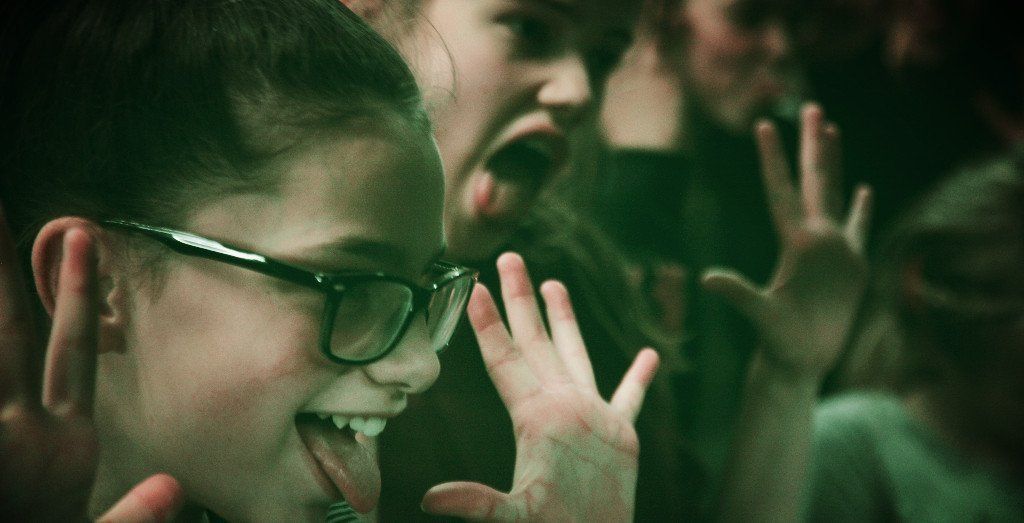
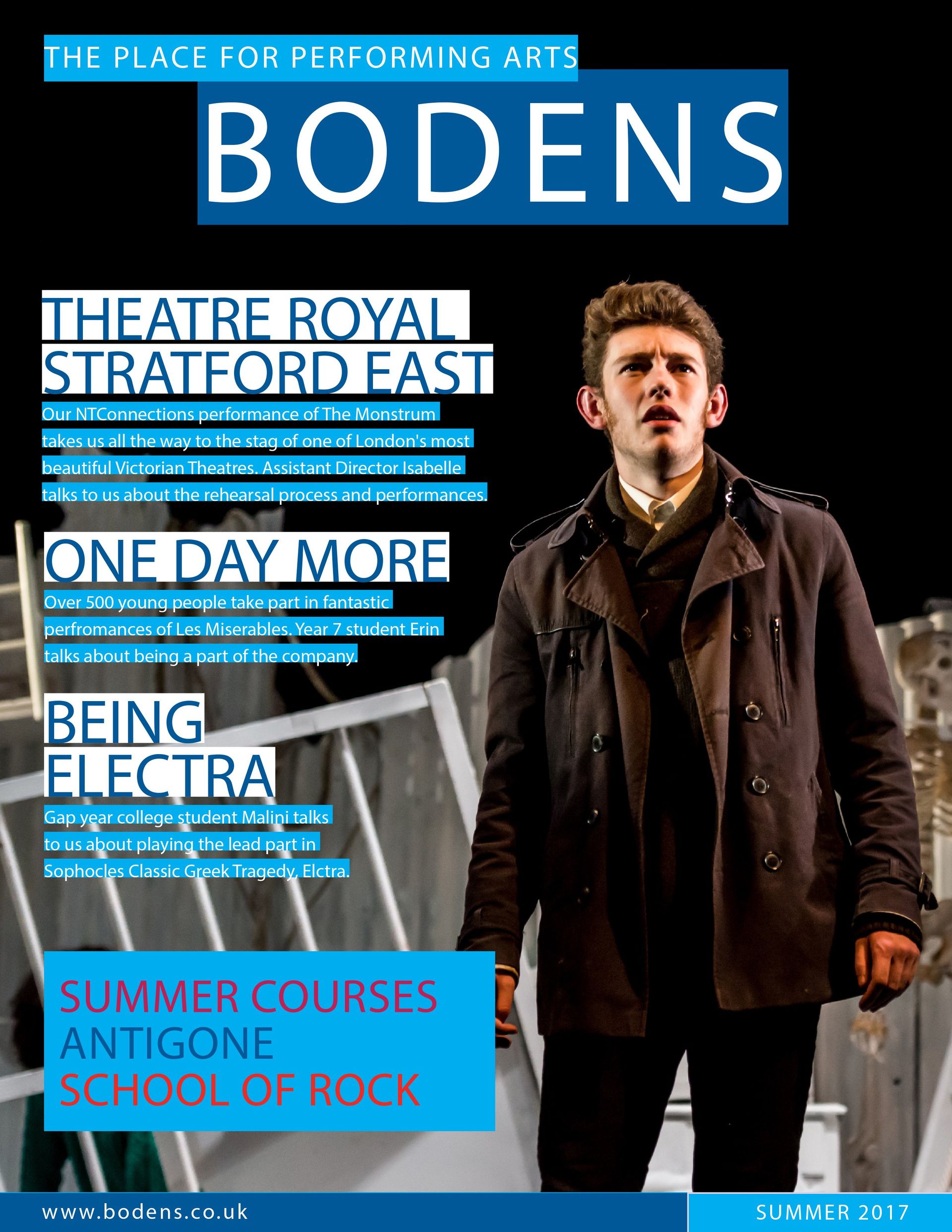
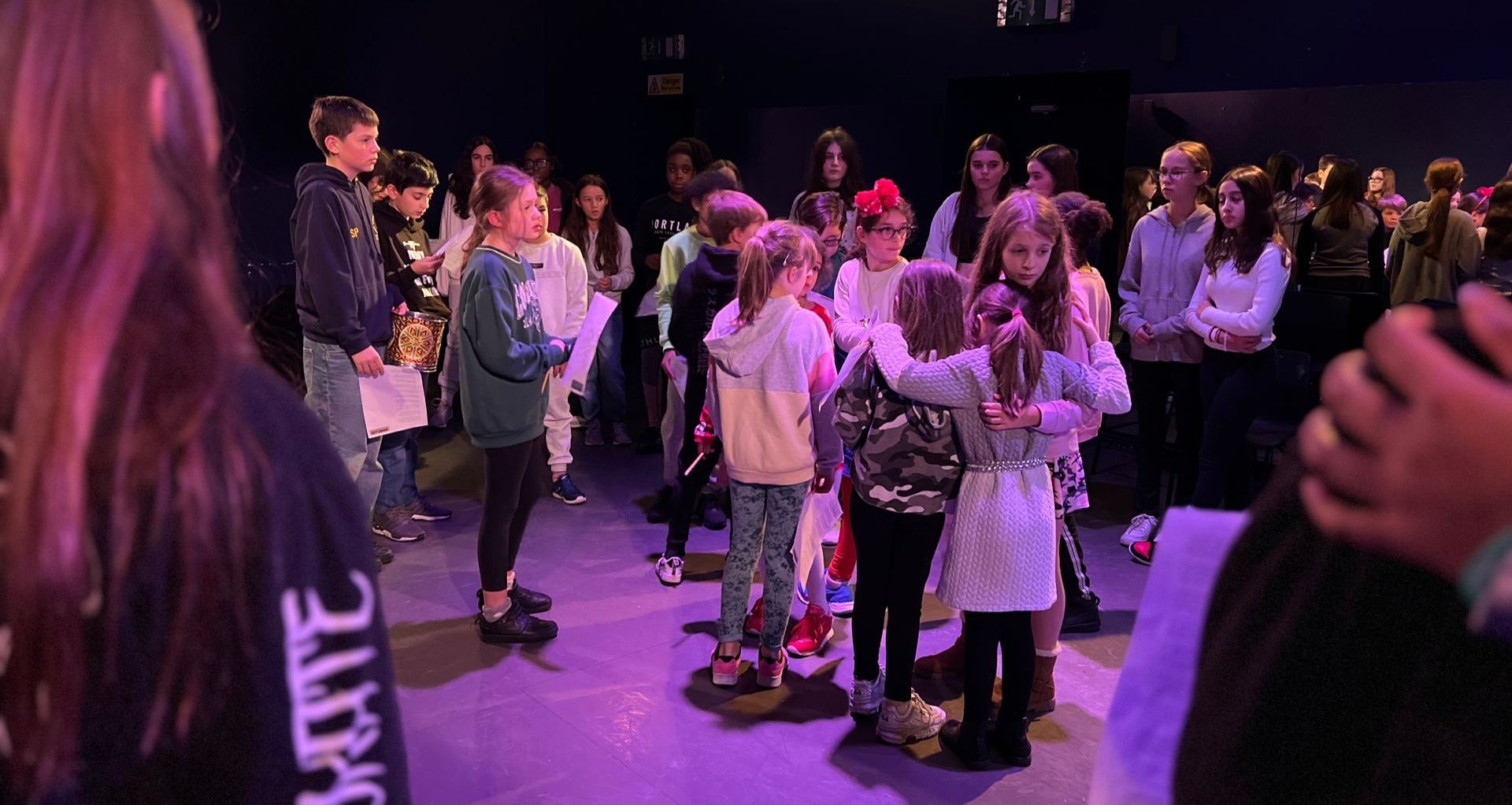
Creating an ancient world for an audience to wander around in is a challenge in itself. Add one hundred young people whose education, enjoyment and experience you have to worry about, an ocean crossing, a giant maze and a minotaur... you might well have a problem. It takes planning, imagination, resources and talent - and if you want to involve the young people throughout the entire creative process, it also takes time.
For those unfamiliar with the terms immersive, interactive or promenade, there's some information below.
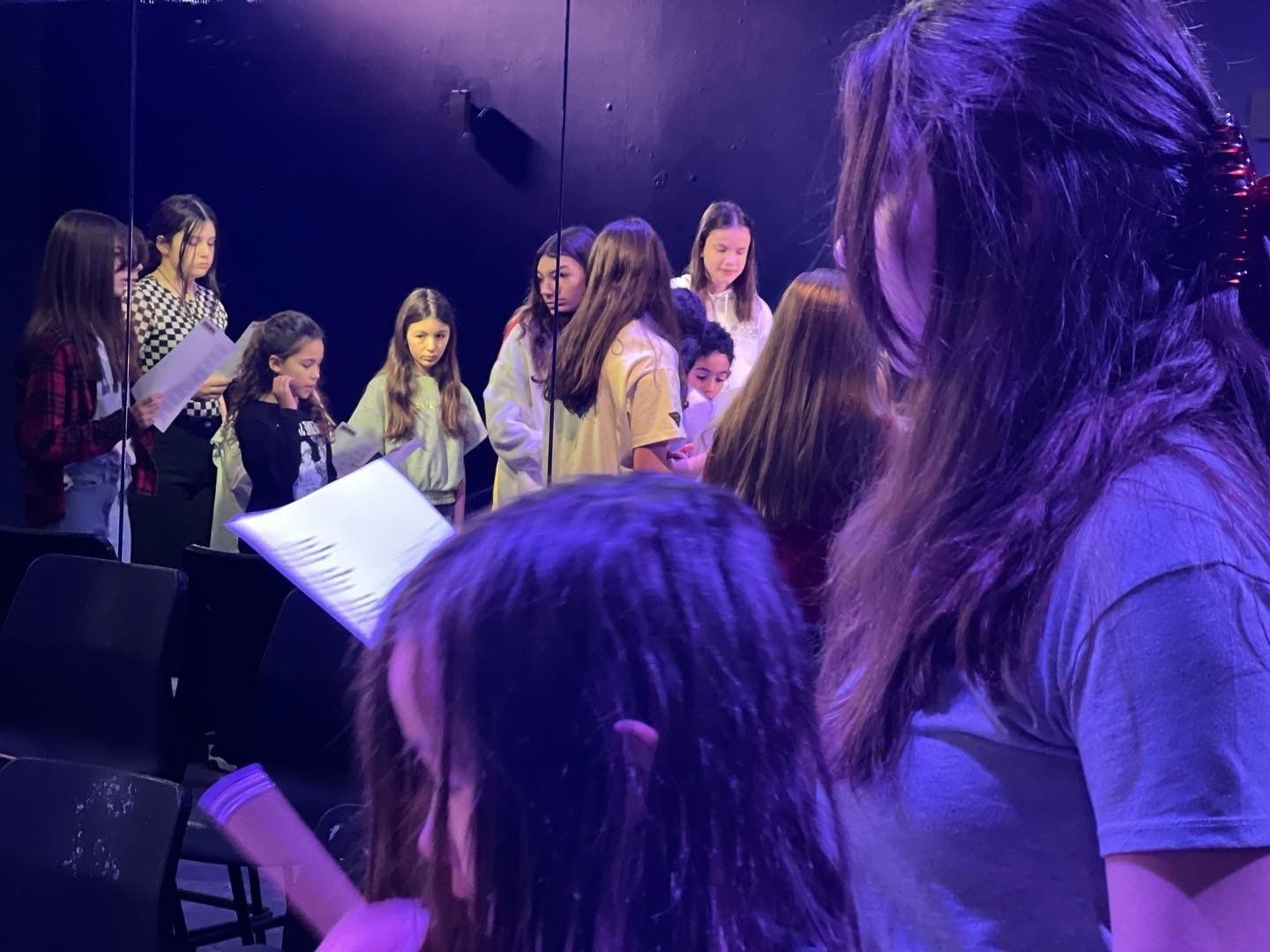
In our immersive productions, the audience don't sit at one end of a theatre and watch the action unfold from the safety of their world, we bring them into ours. They are immersed inside Ancient Greece with the world and story unfolding around them.
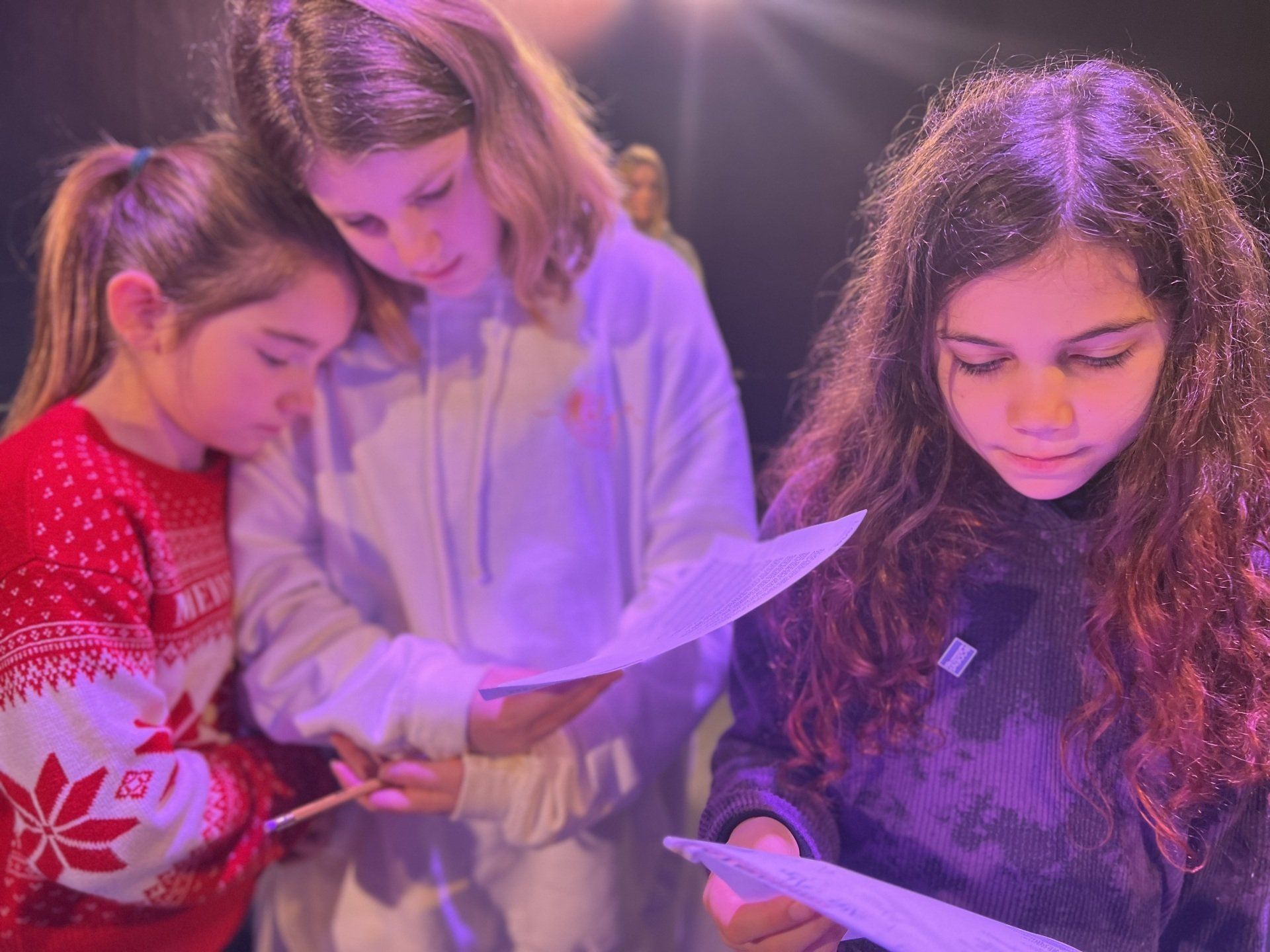
In more traditional theatre, the audience are usually separated from the actors by the invisible 'fourth wall'. In interactive theatre, that wall doesn't exist. The actors are free to communicate directly with the audience, who are often expected to be directly involved in the performance of the play. In Minotaur, our audience take the role of visitors to our special Museum, with their tour guides the Gods themselves.
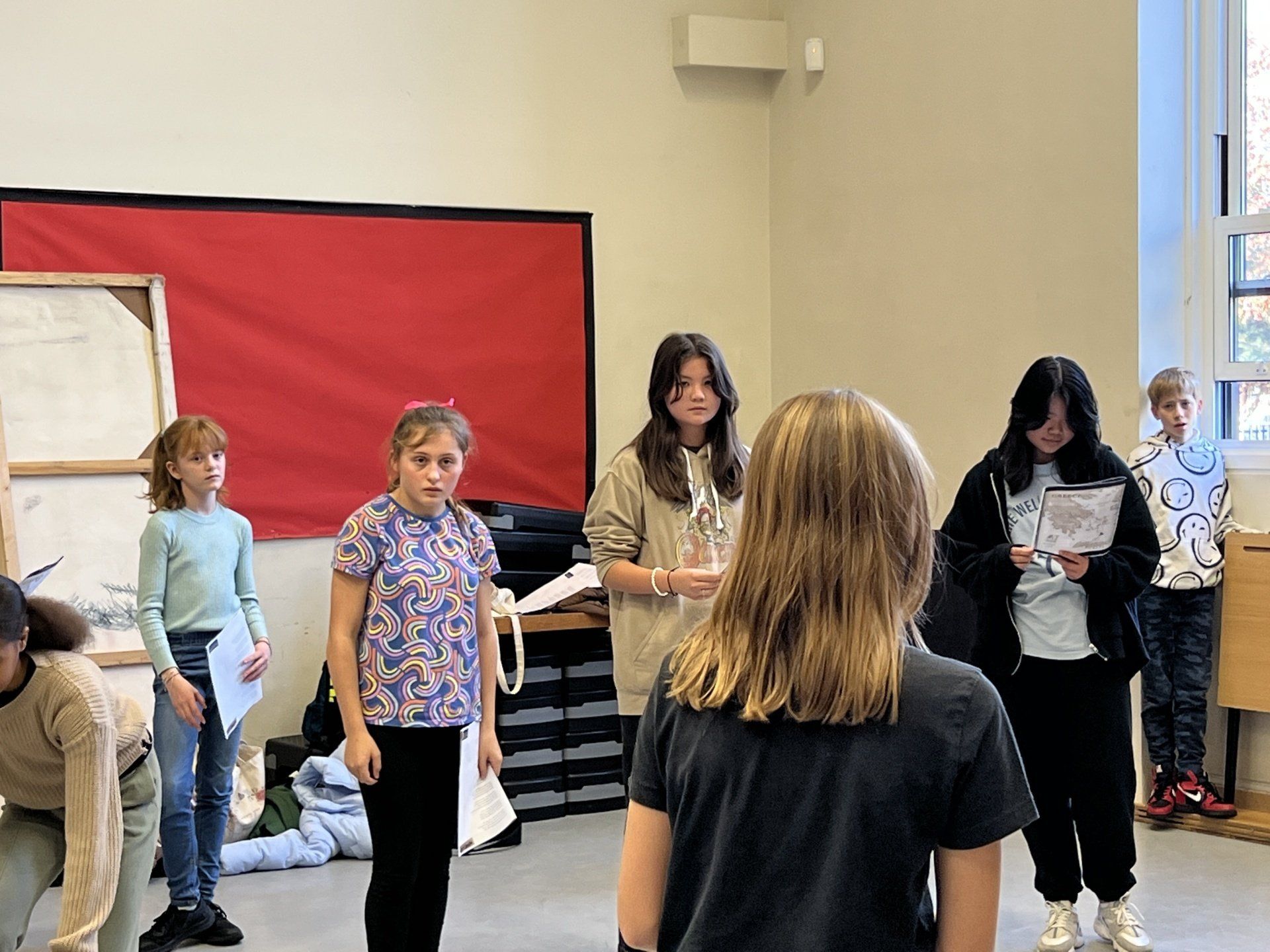
To promenade means 'to walk' and in promenade theatre, the audience follow the actors throughout their performance. In Minotaur, our audience will journey from the houses and marketplace of Athens, across the Archipelago Sea, to the Banqueting Hall of Crete and the Labyrinth beneath the city.
In our first term, we began to unpick the story of Theseus and the Minotaur. We used media, literature and storytelling workshops to unlock the words and themes of this ancient Grecian story. Students recorded their thoughts and feelings; what stood out to them, what resonated with or unsettled them. While our intention is to set the story against the backdrop of Ancient Greece, we can't help but consider the story in our contemporary world. When Theseus breaks his promise to marry Ariadne for her help against the Minotaur, many of our young people wondered who the hero was after all. When you are collaborating with your cast, moving forward, this has to be at the forefront of our considerations. This is when the story ceases being Plutarch's, and starts to become theirs.
With any immersive theatre, a crucial decision to be made is how to bring your audience into the world of the play. With a story like Theseus, you have the added problem of history. How do you ensure your audience understand the world of the play and what has happened previously, before they begin to watch a story unfold within it? We have created the Museum of Athens where the audience will begin their journey under the watchful gaze of one of our tour guides: Aphrodite, Hermes, Apollo or Athena. Alongside ancient artefacts that the audience will later see in their original life, young performers will appear as animated history in our interactive exhibitions.
A promenade performance works by rotating some of the scenes. As the audience move from location to location in smaller groups, actors repeat sections so that everyone sees as much of the action as possible. At points during the piece (the marketplace, banquet and boat) the audience come together and experience the story as a whole. This requires the actors to have the ability to improvise either side of the scripted scenes, within the world of the play. Students spent a term working on their improvisation techniques in preparation for anything that might happen in a production like this. Improvisation is also a very important part of devising characters and story. When we are forced to generate ideas in the moment, we are more likely to create something new or different, that we wouldn't necessarily have put forward if we were sat discussing ideas around a table.
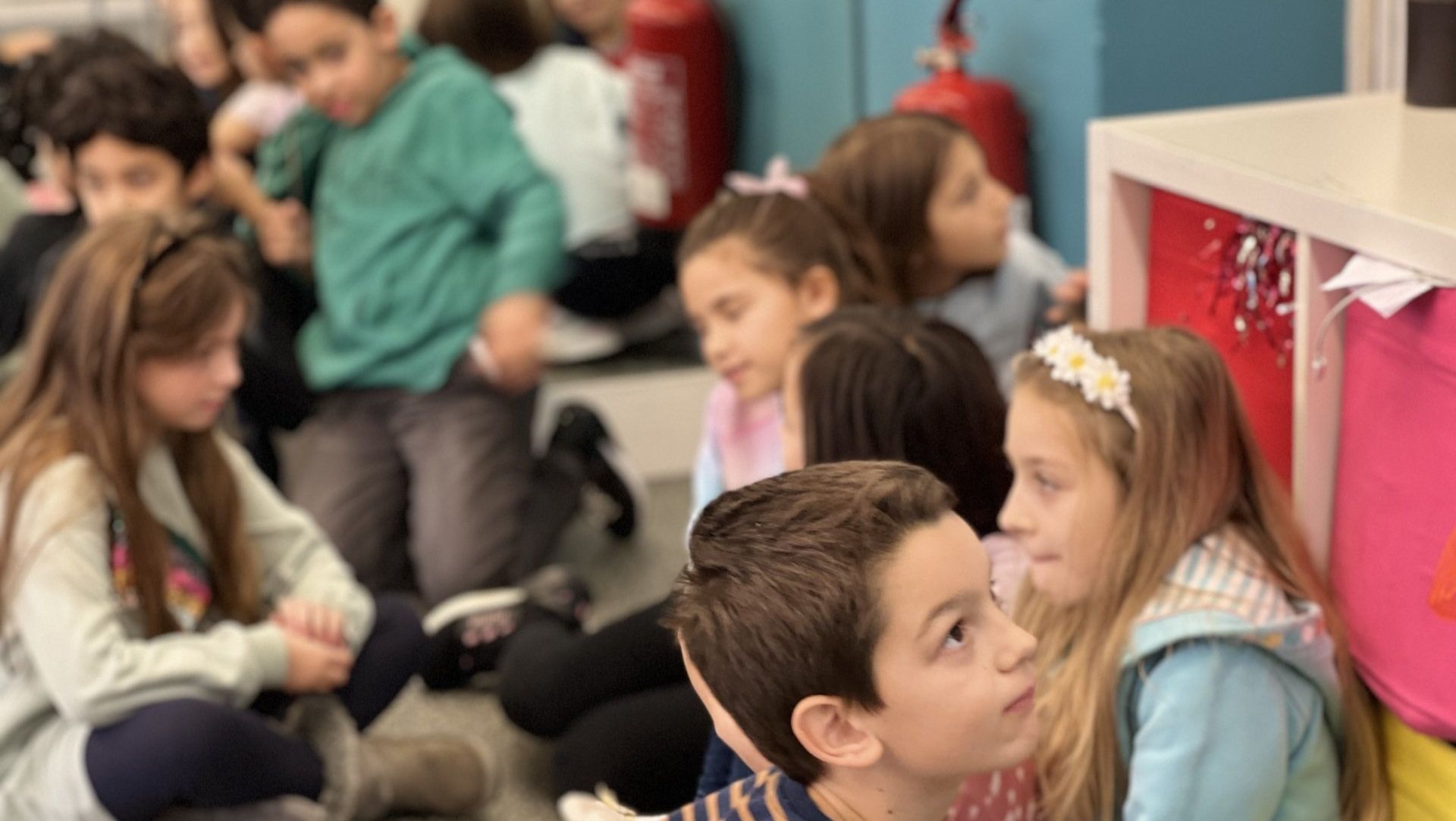
Having chosen the parts of the story to be included, we started the process of creating a script. In this challenging production the text is being written in different forms of verse. For example, the Athenians speak in Iambic Pentameter, similar to much of Shakespeare's verse. The cast have worked on finding the rhythm and poetry of the text, while trying to maintain the storytelling, or communication between the characters.
So as the setting sun softens her stare
Hides behind the earth like a glide downstairs
The dark of night fall shadows anxious air
And silence shrouds the Athens market square
Still you can hear the memory of the war
The dread and fear of what has come before
So long ago the Cretian prince was killed
Yet still the blood of innocents is spilled.
Every ninth year the names must be revealed
And for the chosen children fate is sealed
The people stand together, but alone.
Soon some will suffer heartbreak in their homes.
A booming voice, then the silence smothered
Breath held tight, a loved one clasps another
‘The time has come to read the names aloud!’
Waves of sorrow flood the frightened crowd.
So now we move onto the audition and casting process. Every single participant needs to play an actual part, with an emotional journey and an impact on the story. This term we have already begun the process of characterisation, considering the physical tension, openness, height and eye contact of the character, before working on the voice. Then we shall return to the finished script and make sure we end the penultimate term before the show ready to move into the final stages of rehearsals.
So the last remaining question... to make it a musical, or not a musical...



From what age can you start Bodens Performing Arts?
Our classes are open to students aged 3 to 19 years: our preschool dance classes for 3 years, our STARter Performing Arts for 4-6 years, and the remainder of our timetable is suitable for children and young people aged 7-19 years.
Can I try Bodens before committing to a full term?
We offer a free trial in all of our classes. We then recommend that parents pay on a weekly basis for the first few weeks to give them time to settle before moving onto monthly or termly payments.
How long is a term at Bodens?
Our term lengths vary depending on the London Borough of Barnet school term dates, ranging from 12-15 weeks, including a break for half term.
How much does it cost to attend classes at Bodens Performing Arts?
Prices range from our cheapest thirty minute classes at £6.00 per session, up to our three hour classes priced at £24.00.
When do Bodens classes take place?
We offer classes seven days a week; evening classes running from 4pm-8.30pm weekdays, and weekend options taking place from 9am-6pm on Saturdays and Sundays. Classes take place during the Barnet School term.
What does my child need to wear at Bodens?
While we have branded Bodens merchandise available, students can also attend in any casual clothes that don’t restrict their movement. Syllabus dance classes have a uniform that is available for purchase at the studios from other dancewear stockists.
Does my child need to bring anything with them?
There is a short break midway through our longer performing arts classes, and so we recommend students bring a drink/snack; we have a vending machine on site at our Barnet studios. Students should use a journal/notebook to record their classes and bring a folder to keep hold of scripts, lyrics and worksheets.
What should we do if we are unable to attend one of our Bodens classes?
It is useful if you can contact the office on 020 8447 0909 or at info@bodens.co.uk so that we can let the class tutors know. Students are more than welcome to make up for any session missed, by attending an alternative session that week, though this must be arranged in advance.
What payment methods are available at Bodens Performing Arts?
Payments can be made by cash, cheque, card, childcare voucher or BACS using the following details: Bodens Performing Arts, Sort: 09-01-28, Acc: 47558952
Do you accept childcare vouchers?
Yes, please contact the office on 020 8447 0909, or info@bodens.co.uk to discuss this payment method, to ensure you have the correct provider references.
Are there any discounts available at Bodens Performing Arts?
Yes, there are three schemes available.
Siblings: 25% off the second child’s fees, 50% off the third child and so on.
Multiple Classes: Students attending multiple classes at Bodens, get the third one half price
Recommending a Friend: Current students get 25% of what their recommended friend pays in their first term, off the following term’s fees.
How do you safely recruit teachers?
As part of our Safer Recruitment Programme, and in line with our Safeguarding and Risk Assessment Policies, new staff members complete a full induction process and probation period.
The Senior Management Team review all CVs, conduct a face-to-face interview and undertake reference checks in the first instance. On completion of this, potential candidates participate in training to support the guidelines outlined by the DofE, ‘Keeping Children Safe in Education,’ which includes Safeguarding and Prevent training. DBS Checks, and a review of Bodens Performing Arts’ policies also take place at this stage. As part of the probation period, tutors run workshops, which are observed by a member of staff and once appointed, our tutors are monitored regularly within our CPD Programme, which includes training in Lesson Planning, Class Delivery and Student Feedback to ensure our students are able to achieve their potential throughout their time at Bodens Performing Arts. Tutor Observations are undertaken by a member of the Senior Management Team on a regular basis to ensure high standards are maintained, and learner progression is effective.
Do you do exams/dance syllabus?
We provide students with the opportunity to participate in a variety of classes; some aimed at taking exams, and others focused on performances and our tailored programme to support student progression. With regards to our syllabus classes, we are accredited by the Royal Academy of Dance (Ballet), Imperial Society of Teachers of Dancing (Tap & Modern) and Trinity College (Acting & Musical Theatre).
Are you Ofsted Registered?
Yes, we are, and our registration number is EY461575.
Do you offer Holiday Courses?
We provide week-long holiday courses throughout the summer, ranging from Film Production Acting Courses, through to Musical Theatre. More information can be found using the Summer Courses link at the top of our website.
What if my child is considering leaving classes at Bodens?
Please contact a member of our team on 020 8447 0909, who will be happy to discuss the options available.
Can they bring a friend?
Absolutely! We offer free trial classes, which can be booked in advance by contacting the office on 020 8447 0909. There is a discount available, enabling current students to get 25% of what their recommended friend pays in their first term, off the following term’s fees.
Are you associated with an Agency?
Yes, for over forty years, Bodens Agency has been representing children and young people for professional work in Theatre, Film and Television. We represent talented and capable young actors with experience and an ability to deliver real and truthful performances, on stage or screen. Our staff recommend students to our lead agents regularly throughout the year.
Why do you separate the children into classes of smaller age groups than other performing arts providers?
Within our classes, the groups are determined by a child’s school year to enable our staff to prepare lessons targeting specific learning objectives, most appropriate for the age group. We see the best progression when the age bracket remains smaller, as the teaching approaches, repertoire and styles used are specifically designed to enhance the learning experience of the individuals in that class.
Do you do shows?
Our students work towards productions on a regular basis; ranging from contemporary and classical plays through to musicals throughout the year, we also provide termly watch-week sessions for our dance classes, certificate presentations for our examination students and an annual awards ceremony. Many of the shows take place in our own Scaffold Theatre, although we also provide students with the opportunity to perform in other venues, most recently Jacksons Lane (Highgate) and Cockpit (Marylebone).
What development can I hope to see in my child?
The majority of children and young people in our classes show varied improvement in the development of their confidence and communication, knowledge and application of techniques, and overall improvement in their ability as a performer. The level of growth in these areas depends on the individual student and their initial capabilities and confidence. Just as important as these areas are the transferable skills the classes also target: creativity, focus, grit and determination, empathy and self belief. Through the teaching approach at our school, the students learn to confidently perform as themselves.
Bodens Performing Arts, Unit 713, 275 New North Road, Islington, London N1 7AA
020 8447 0909 info@bodens.co.uk 07545 696 885
Copyright © 2024